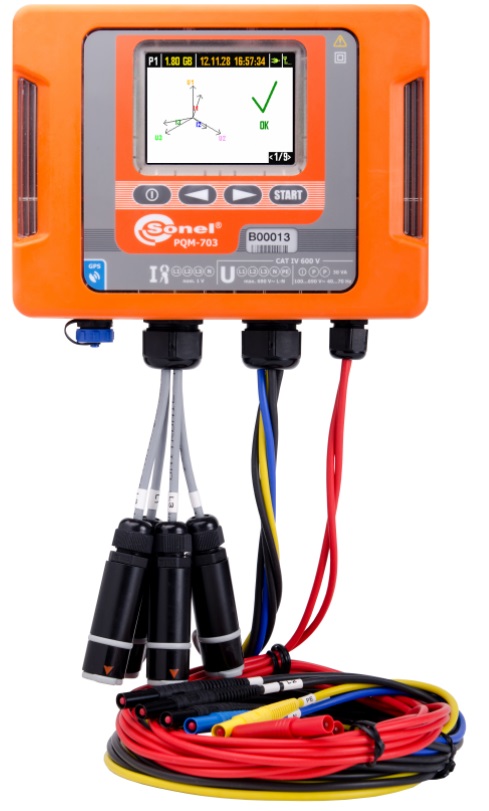
Special version for Australia & NZ with Australian Phase colours and Software with Australian standards Same as PQM-702A but with transient capture and mains signalling Power quality analyzer PQM- 703 is a techni********* comprehensive measurements of the quality of electricity , analysis and recording of power network parameters, for frequencies 50/60 Hz in accordance with Australian standards. PQM -703 is another representative of a well, known family of analyzers line PQM- 70x . In relation to the PQM -702 has new functions like recording of transients with max. sampling frequency 10 MHz (rapid changes in voltage) and control signals. Minimal transient captu********* r a very wide range of users who need to control the quality of power with a mobile device , which fulfills the requirements of a multi-sheet standard IEC 61000 for class A analyzers. This applies to measurement accuracy, measurement methods, and synchronization of time with a standard signal. The last condition is met with a built-in GPS module with an internal antenna. If the analyzer is installed inside, it is possible to use an additional antenna with a 10m-long wire. If the antenna is situated outside, GPS signal will be attainable without any problems and used for the synchronization of an internal clock. In practice, the analyzer may be used with all network types with rated voltage from 110 V to 760 V, directly or indirectly via transducers. It works in the following networks: one-phase, split-phase with N wire, three-phase Wye type, with and without N wire, three-phase delta type, DC voltage. Thanks to these features PQM -703 can be used in power engineering and maintenance services fields for industrial plants , as well as by persons providing services in the power network analysis field. ANALYZER MEASURES AND RECORDS ACCORDING TO THE IEC 61000-4-30 CLASS A STANDARD Power to the analyzer is supplied from tested mains (internal power supply) and is used in all types of networks from 64 V to 760 V. With particular emphasis on measurements at low voltage poles, due to the ease of connection. Has an independent power supply socket, especially suited for voltage measurements for transformers and DC circuits. Remote control and data transfer through a built-in GSM modem (GPRS). Anti-theft feature - SMS notification in the event of position change - built-in GPS receiver. Real-time clock synchronized to GPS protocol. Live mode oscilloscope display Colour LCD display of real time measurements & vector diagram 600V CAT IV IP65 weatherproof Wireless & USB communication Possible measurements: Measurements according to EN 50160 & Australian standards Voltage L1, L2, L3, N-PE - average, minimum, maximum and instantaneous values, range to 760V, ability to work with voltage transformers, Current L1, L2, L3, N (four inputs) - average, minimum, maximum and instantaneous values, measurement current with range to 3 kA (depends on used clamp), ability to work with current transformers, Crest factor for voltage and current, Frequency from 40Hz to 70Hz , Active, reactive, distortion, apparent power, including the type of reactive power (capacitive, inductive), Power recording: - Budeanu method, - IEEE 1459, Active, reactive, apparent energy, Power factor, cosφ, tgφ, K factor (transformer overload caused by the harmonics), Up to 50th harmonics for voltage and current, Total Harmonic Distortion (THD) for voltage and current, Short-term (PST) and long-term (PLT) flicker, Unbalance of voltage and current, Current events detection including waveforms recording, Current and voltage waveforms recording after each averaging period. Mains signalling up to 3000 Hz. Transients up to ±6000 V, minimal transient capturing time is 650 ns. All parameters meet Class A acc. IEC 61000-4-30 standard. The device is designed to work with networks: with nominal frequency 50/60Hz, with nominal voltage: 64/110 V; 110/190 V; 115/200 V; 127/220 V; 220/380 V; 230/400 V; 240/415 V; 254/440 V; 290/500 V; 400/690 V, DC network
Location: 7 Anella Ave 7 Anella Ave, Castle Hill NSW 2154, Australia
N/A
When you call, Don't forget to mention ADSCT whenever you will call to user. Be safe during payment.